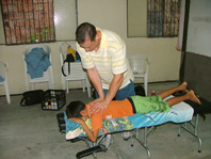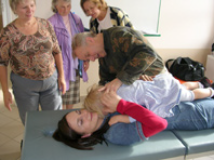
The Evangelical Christian Voice in Chiropractic Since 1953


Hosting a Chiropractic
Short-Term Mission
Field needs to make a chiropractic
short-term mission successful


Chiropractic is an ideal tool for assisting Missionaries in accomplishing their
tasks. While the physical needs can be overwhelming, meeting those needs in a
mission context should be secondary to evangelism, discipleship and church
planting. We should never lose sight of the purpose of ministry by being
distracted by other activities.
Ken Fleming, brother of the martyred Ecuadorian missionary, Pete Fleming,
a veteran missionary, states that missionaries have three tasks before them.
• First and foremost is evangelism to reach the lost with the Gospel.
• Then discipleship to build up the converts.
• And the final task is church planting to establish those reached in communities of faith to function in the body of Christ.
In our sixty-plus-year history the Christian Chiropractors Association has had numerous experiences with the success of
Chiropractic in fulfilling the actual goals of missions. The effectiveness of chiropractic on the field has many aspects. Support staff
needs are minimal; supplies needed are almost none. When we send a chiropractor, all that is necessary is a suitcase in one hand
and a portable-adjusting table in the other. Most chiropractic procedures can be done quickly, allowing for a large number of people
to be reached each day. Typically this means hundreds of people can hear the Gospel. The biggest need is logistical support. In
country, transportation, housing, food, and translation are most of what is required. CCA members typically provide for their own
expenses, including airfare and ground costs.
Field needs:
The local body of believers who want to host a clinic needs to be mature enough for
growth. The responsibility for evangelism and discipleship is theirs. One missionary or
elder who is established in their faith can be all that is needed to see a church blessed by
a short-term chiropractic clinic. Obviously having more involved in local leadership is
desirable.
The local hosts need to make the arrangements for the clinics by scheduling times,
places and transportation. Also one translator is needed to help each doctor. Most
important is how the evangelism and follow-up are handled. We want to sow good seed
on good ground and see it cultivated. Our role in evangelism is to share the Good News
and be able to see the Holy Spirit reach hearts and change lives. Typically each chiropractor can care for a good number of people
in a week.
Our missions can be done anywhere that either does not license chiropractic or where legal permission can be obtained. In third-
world countries, we find that using chiropractic to draw people in has been very successful. When people are told that chiropractic
will help if they have headaches, neck or back pain or other health or musculo-skeletal problems, then their interest is piqued.
Christians can invite family, friends or anyone they know to be checked. While people in pain are the easiest to attract, it can be
productive to invite the curious. Local official and news media may be approached and are often interested to do stories about the
clinics. Posters and flyers can be used. Once a few patients have been seen and are feeling better, they will tell other of the
services. The first day of a clinic may start slow but that usually changes fast as the days go on. The time can become quite busy if
the local believers are involved.
The message of the Gospel is better heard when the listener has confidence
in the messenger. Many times it is necessary for Christians to spend a lot of
time building relationships to gain an audience for God's Word. And while
this approach is valid, it can take time. Chiropractic clinics appear to have
unique impact. They build instant relationships when human touch brings
almost immediate help, which in turn makes people receptive to the Gospel.
If your church is ready to reach out with the Gospel you should prayerfully
consider inviting a chiropractic team. Chiropractic clinics also work well in
conjunction with other medical/dental outreaches.





